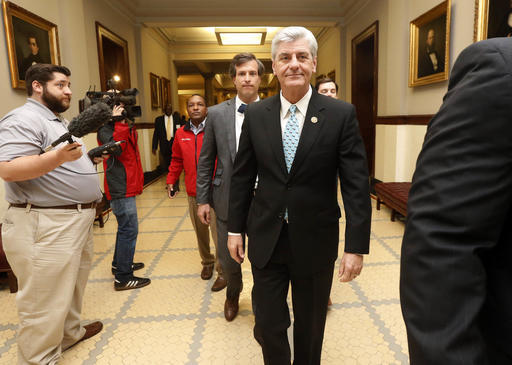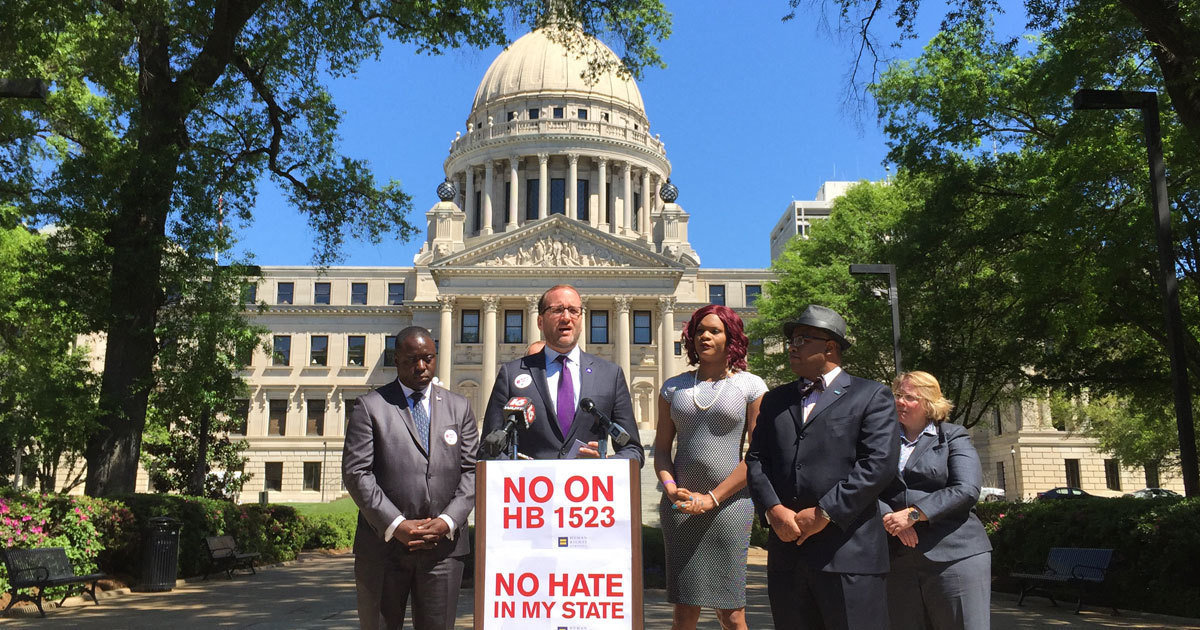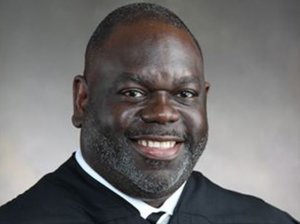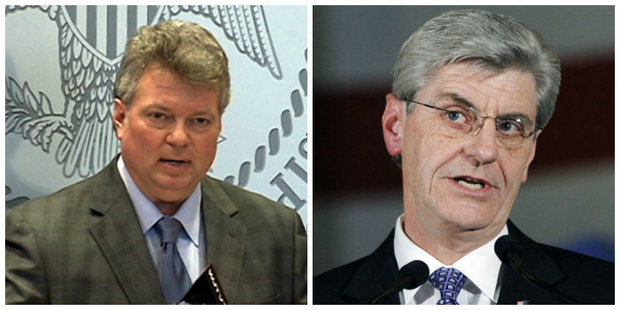

JACKSON, Mississippi (AP) — Mississippi’s governor signed a law on Tuesday that allows public and private businesses to refuse service to gay couples based on the employers’ religious beliefs.
Gov. Phil Bryant signed House Bill 1523, despite opposition from gay-rights groups and some businesses who say it enables discrimination. Some conservative and religious groups support the bill.
The measure’s stated intention is to protect those who believe that marriage should be between one man and one woman, that sexual relations should only take place inside such marriages, and that male and female genders are unchangeable.
“This bill merely reinforces the rights which currently exist to the exercise of religious freedom as stated in the First Amendment to the U.S. Constitution,” the Republican governor wrote in a statement posted to his Twitter account.
The measure allows churches, religious charities and privately held businesses to decline services to people whose lifestyles violate their religious beliefs. Individual government employees may also opt out, although the measure says governments must still provide services.
“This bill does not limit any constitutionally protected rights or actions of any citizen of this state under federal or state laws,” Bryant said. “It does not attempt to challenge federal laws, even those which are in conflict with the Mississippi Constitution, as the Legislature recognizes the prominence of federal law in such limited circumstances.”
Other states have considered similar legislation. North Carolina enacted a law, while governors in Georgia and South Dakota vetoed proposals.
Bryant acted within hours of receiving the bill after it cleared its final legislative obstacle Monday, even as opponents tried to marshal pressure to persuade Bryant to reject it.
Some of the state’s largest employers including Nissan Group of North America, Tyson Food Inc, MGM Resorts International, and Toyota issued statements voicing their opposition to the legislation, joining national corporations such as AT&T, IBM, Levi Strauss & Co, MassMutual, General Electric, and Hyatt Hotel Corporations.
The Mississippi Manufacturer’s Association (MMA) also called for Bryant to veto the bill.
“It is clear that many of our members find that HB 1523 would violate their corporate policies expressly providing for an inclusive workplace environment that supports diversity,” said MMA president Jay Moon. “This is not a bill that the MMA supports and we hope that it will not find its way into law.”
The Episcopal Diocese of Mississippi released a statement last week condemning the bill as well. Tuesday, reaction from various human and civil rights groups was swift after Bryant signed the bill.
“Governor Phil Bryant adds his name to a list of disgraced Southern governors by signing this hateful and discriminatory bill into law,” said Chad Griffin, president of the Human Rights Campaign, the nation’s largest lesbian, gay, bisexual, and transgender (LGBT) civil rights organization.
“Governor Bryant refused to meet with LGBT people and even turned us away at the door of his office. He refused to listen to business leaders. He refused to listen to Mississippians. And now his state will suffer because of his ignorance and failure of leadership. Just as we’re doing elsewhere, we will continue to rally fair-minded voters, businesses, and civil rights advocates to repeal.”
“This bill flies in the face of the basic American principles of fairness, justice and equality and will not protect anyone’s religious liberty,” said Jennifer Riley-Collins, Executive Director of the American Civil Liberties Union of Mississippi. “Far from protecting anyone from ‘government discrimination’ as the bill claims, it is an attack on the citizens of our state, and it will serve as the Magnolia State’s badge of shame.”
Spokesperson Ouida Meruvia also issued a statement on behalf of the Mississippi Democratic Party.
“It is incredibly disappointing that Governor Bryant and Republican leaders of our state, despite our history, have decided to pass a law that licenses discrimination against our own citizens,” Meruvia said. “Instead of tearing down walls that divide, the Republican Party has spent this session building new barriers of bigotry. We must do better.”
Jody E. Owens, managing attorney in Mississippi at the Southern Poverty Law Center, also condemned HB 1523.
“Governor Phil Bryant’s decision to sign HB 1523 into law is unconscionable,” Owens said. “This newly enacted law – like the draconian anti-LGBT laws in other states – uses the guise of ‘religious freedom’ to justify discrimination, mistreatment and bigotry.
“It’s the same sort of rationale used by white supremacists in earlier eras to justify slavery and Jim Crow. The estimated 60,000 LGBT people in Mississippi deserve better. We need to stand up for the rights of all people.”
Mississippi Press staff writer Warren Kulo contributed to this report.




Be the first to comment